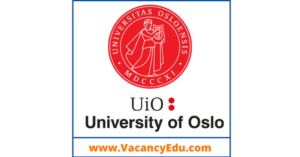University of Oslo, Norway invites online Application for number of Fully Funded PhD Positions at various Departments. We are providing a list of Fully Funded PhD Programs available at University of Oslo, Norway.
Eligible candidate may Apply as soon as possible.
(01) PhD Positions – Fully Funded
PhD position summary/title: PhD Research Fellowships in Economics
3-5 PhD Research Fellow positions (SKO 1017) for the PhD programme are available at the Department of Economics.
The appointments are for a period of 4 years with 25% teaching and administrative duties. PhD Research Fellows will automatically be admitted to the Faculty of Social Sciences’ PhD programme and benefit from the Faculty’s organized research training.
One position is funded by the Norwegian Centre for International economics and requires that the candidate’s research interests and project proposal are related to international economics and/or development economics.
The remaining positions are not linked to specific topics or research projects. Applications from candidates in all fields of economics are encouraged, in particular in fields where the department has a strong research base and supervision capacity.
Deadline : 15th January 2026
(02) PhD Positions- Fully Funded
PhD position summary/title: 2 Doctoral Research Fellowships in Ancient Philosophy associated with the ERC funded project MatNat
2 Doctoral Research Fellowships (SKO 1017) in Ancient Philosophy are available at the Department of Philosophy, Classics, History of Art and Ideas, University of Oslo.
The positions are a part of the project ‘The Mathematization of Nature: The Origin of Mathematical Physics in Plato and Early Pythagoreanism’ (MatNat), funded by the European Research Council (ERC Advanced Grant, 101199790). More information about the project can be found here.
Deadline : 4th January 2026
View All Fully Funded PhD Positions Click Here
(03) PhD Positions – Fully Funded
PhD position summary/title: PhD Research Fellow in (Pharmaceutical) analytical chemistry
The position is part of the EU funded Marie Skłodowska-Curie Actions Doctoral Network (MSCA-DN) “MIPrecise”. This network is coordinated by Börje Seller-gren from the Malmö University.
More information on MIPrecise can be found here:
MIPrecise – Development and use of stable synthetic antibodies and de-signed receptors as diagnostic tools to reduce cancer treatment disparities
The candidate will work with implementing Molecularly Imprinted Polymers (MIPs) in the sample preparation workflow of bottom-up liquid chromatography-mass spectrometry (LC-MS) analysis of established disease biomarkers. Novel MIP-assays developed in the project will be validated against conventional assays (including both immunoassays (where available) and MS-based assays). The
project will mainly be conducted at the Department of Pharmacy, University of Oslo (UiO), but will include secondments (total approximately 6 months) to Proteome Sciences, Frankfurt (Germany), University of Strathclyde, Glasgow (United Kingdom) and Capitainer AB (Sweden).
At UiO the candidate will focus on the determination of biomarkers for Small Cell Lung Cancer (SCLC), which is an aggressive form of lung cancer with a short survival after diagnosis (few months). Since SCLC is sensitive for treatment, early diagnosis or proper monitoring is of high interest. Our research focuses on design and development of the sample preparation and the possibility to determine and differentiate multiple SCLC markers simultaneously at ultra-low concentrations which might allow a more robust and personalized diagnostic profile in the future.
Deadline : 30th November 2025
(04) PhD Positions – Fully Funded
PhD position summary/title: PhD Research Fellow in computational neuroscience/brain physics
The position is funded by EU Horizon and part of the Marie Sklodwoska-Curie Doctoral Network NeuroNanotech: ‘Integrating Nanotechnology and Neurocomputational Modeling for Advanced Brain Interfaces’. The NeuroNanotech project aims to develop next-generation neurotechnological tools by integrating computational and experimental approaches to understand how nanoscale materials and electromagnetic interactions affect brain function. The PhD project will focus on biophysical modeling of electrical and magnetic brain signals and the mechanisms through which externally applied fields influence neural dynamics.
Deadline : 9th December 2025
(05) PhD Positions – Fully Funded
PhD position summary/title: PhD Research Fellow in Microbiology/Biotechnology
The PhD candidate will develop bacterial biofilm models with single or multiple bacterial species under aerobic and anaerobic conditions. You will use these model biofilms to test medical implants and other medically relevant surfaces. They will also be used to test the effect of mutations in surface attachment genes of individual, implant-related ESKAPE pathogens.
The work is a close collaboration with an Oslo-based company interested in medical implants, Corticalis AS. The position thus offers the opportunity to work in an academic setting but in close collaboration with a commercial partner.
Methods will include microbial growth of pathogenic bacteria on surfaces under different growth conditions, including the use of fermentation equipment and anaerobic chambers. Analytical methods will include (but are not restricted to) light microscopy/FISH, molecular biology (qPCR), and possibly next-generation sequencing techniques.
Deadline : 6th January 2026
Polite Follow-Up Email to Professor : When and How You should Write
Click here to know “How to write a Postdoc Job Application or Email”
(06) PhD Positions- Fully Funded
PhD position summary/title: PhD Research Fellow in ML-assisted reservoir characterization/modelling for CO2 storage
The VISTA Centre “VICCO” at the Department of Geosciences, University of Oslo (UiO) seeks a highly motivated candidate for a PhD research fellowship aimed at de-risking CO2 storage in volcano-sedimentary systems offshore Norway. The PhD research project targets ML-assisted quantitative interpretation and geomechanical modeling by integrating seismic, well log, lab and literature data to de-risk potential CO2 storage sites associated with volcaniclastic lithologies offshore Norway. The research outcomes will lead to better understanding of the geological heterogeneity of reservoir, seal and overburden rocks that may impact seal integrity, fluid injectivity, storage performance, plume evolution, and pressure-build ups in potential multi-site storage licenses. The research will help to suggest best practices for machine learning integration in de-risking CO2 storage sites. We seek a candidate with a strong background in one or more of the fields of rock physics, petrophysics, seismic attribute analysis, seismic inversion (both pre- and post-stack inversions), and machine learning with geoscience knowledge, preferably in seal/reservoir/overburden heterogeneities, static and dynamic reservoir modelling, and flow simulation. The candidate will work in a team of geologists, geophysicists, geochemists and staff with strong machine learning and numerical modelling background to add knowledge on the impact of geological heterogeneity and subsurface environments (e.g., depth, exhumation, temperature, pressure) to de-risk CO2 storage possibilities in volcano sedimentary systems, offshore Norway. There will be a close collaboration between UiO and other research institutes and industries participating in the VISTA centre “VICCO”. The study areas will be selected based on the VICCO centre’s focus and guidance from industry partners.
Deadline : 31st December 2025
(07) PhD Positions – Fully Funded
PhD position summary/title: PhD Research Fellow in Mobile Robotics
The PhD research fellow will work in the Autosender project, which is a collaborative project between the Department of Technology Systems at the University of Oslo and the Norwegian Defence Research Establishment (FFI). The project aims to enhance current multi-sensor situational awareness systems integrating them with a new autonomous unmanned ground vehicle capable of navigating Norwegian forest environments. The main goal of the project is to develop and implement an intelli-gent autonomous solution that can deploy and retrieve sensor nodes efficiently, targeting dual-use applications for both military and civilian purposes. The fellow will mainly work on robot development and autonomous navigation but based on the interests of the PhD fellow there are also opportunities to investigate planning and optimization of sensor placement, human-robot interaction, operation in winter and arctic conditions, as well as use of communication nodes in addition to the sensor packages.
Deadline : 3rd December 2025
(08) PhD Positions – Fully Funded
PhD position summary/title: PhD Research Fellow in Molecular Microbiology
The PhD candidate will study bacterial adhesins and their interactions with host receptors. The work centers on adhesins from Klebsiella and Enterobacter species, which are two of the ESKAPE pathogens notorious for their emerging multidrug resistance. In this project, you will help to identify bacterial adhesins in the genomes of ESKAPE strains and generate knockout mutants. Using infection assays, you will establish the importance of these adhesins in different stages of the infection process and identify host cell receptors.
The work is in close collaboration with other groups in the network interested in host cell receptors, and in anti-adhesion drug development. The position thus offers the opportunity of internships with both academic and industrial partners.
Methods will include the generation of mutants and other methods in molecular microbiology, protein expression and purification, and both cellular infection assays and biophysical adhesion assays. An integral part of the work is the identification of host cell receptors using mass spectrometry.
Deadline : 6th January 2026
Click here to know “How to Write an Effective Cover Letter”
About The University of Oslo, Norway – Official Website
The University of Oslo, until 1939 named the Royal Frederick University is the oldest university in Norway, located in the Norwegian capital of Oslo. Until 1 January 2016 it was the largest Norwegian institution of higher education in terms of size, now surpassed only by the Norwegian University of Science and Technology. The Academic Ranking of World Universities has ranked it the 58th best university in the world and the third best in the Nordic countries. In 2015, the Times Higher Education World University Rankings ranked it the 135th best university in the world and the seventh best in the Nordics. While in its 2016, Top 200 Rankings of European universities, the Times Higher Education listed the University of Oslo at 63rd, making it the highest ranked Norwegian university.
The university has approximately 27,700 students and employs around 6,000 people. Its faculties include (Lutheran) theology (with the Lutheran Church of Norway having been Norway’s state church since 1536), law, medicine, humanities, mathematics, natural sciences, social sciences, dentistry, and education. The university’s original neoclassical campus is located in the centre of Oslo; it is currently occupied by the Faculty of Law. Most of the university’s other faculties are located at the newer Blindern campus in the suburban West End. The Faculty of Medicine is split between several university hospitals in the Oslo area. The university also includes some formally independent, affiliated institutes such as the Centre for International Climate and Environmental Research (CICERO), NKVTS and the Frisch Centre.
The university was founded in 1811 and was modeled after the University of Copenhagen and the recently established University of Berlin. It was originally named for King Frederick VI of Denmark and Norway, and received its current name in 1939. The university is informally also known as Universitetet (“the university”), having been the only university in Norway, until 1946 and was commonly termed “The Royal Frederick’s” (Det Kgl. Frederiks), before the name change.
The Nobel Peace Prize was awarded in the university’s Atrium, from 1947 to 1989 and will be so again in 2020, making it the only university in the world to be involved in awarding a Nobel Prize. Since 2003, the Abel Prize is awarded in the Atrium. Five researchers affiliated with the university have been Nobel laureates.
Disclaimer: We try to ensure that the information we post on VacancyEdu.com is accurate. However, despite our best efforts, some of the content may contain errors. You can trust us, but please conduct your own checks too.
Related Posts




